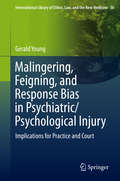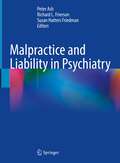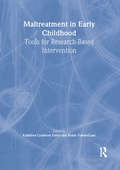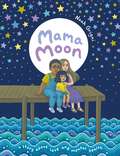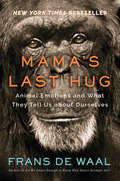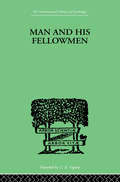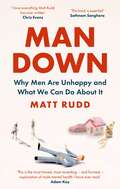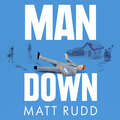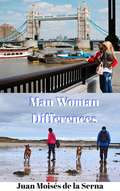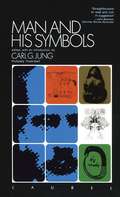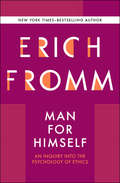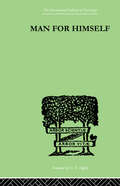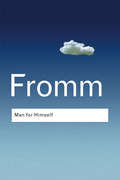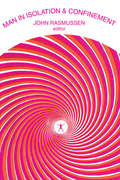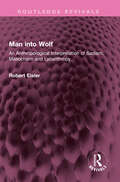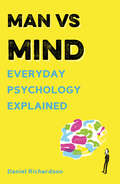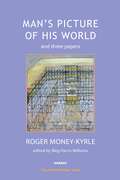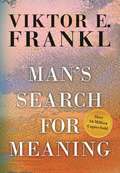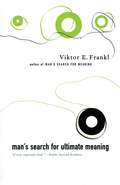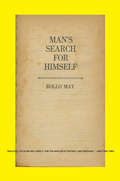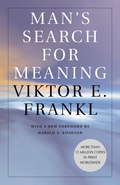- Table View
- List View
Malingering, Feigning, and Response Bias in Psychiatric/ Psychological Injury
by Gerald YoungThis book is a comprehensive analysis of the definitions, concepts, and recent research on malingering, feigning, and other response biases in psychological injury/ forensic disability populations. It presents a new model of malingering and related biases, and develops a "diagnostic" system based on it that is applicable to PTSD, chronic pain, and TBI. Included are suggestions for effective practice and future research based on the literature reviews and the new systems, which are useful also because they can be used readily by psychiatrists as much as psychologists. In Malingering, Feigning, and Response Style Assessment in Psychiatric/Psychological Injury, Dr. Young ambitiously sets out to articulate and synthesize the polarities involved in the assessment of response styles in psychological disabilities, including PTSD, pain, and TBI. He does so thoroughly and very even-handedly, neither minimizing the degree that outright faking can be found in substantial numbers of examinees, nor disregarding the possibility that there can be causes for validity test failure other than malingering. He reviews the prior systems for classifying evidence of malingering, and proposes his own criteria for feigned PTSD. These are conservative and well-grounded in the prior literature. Finally, the book contains dozens of very recent references, giving testament to Dr. Young's immersion in the personal injury literature, as might be expected from his experience as founder and Editor in Chief for Psychological Injury and the Law. Reviewer: Steve Rubenzer, Ph. D. , ABPP Board Certified Forensic Psychologist
Malpractice and Liability in Psychiatry
by Peter Ash Richard L. Frierson Susan Hatters FriedmanThis book comprehensively educates psychiatrists about malpractice and other liability. It is written to also specifically assist psychiatrists who are sued or are involved in other complaints. The first two sections discuss malpractice law and the litigation process; the litigation section mainly addresses some of the more emotionally charged issues, including do’s and don’ts, how an attorney will be looking at the case, the defendant doctor’s testifying at deposition and trial, and the stress of being sued. The subsequent three sections address specific topics that give rise to liability, with each section taking a different perspective such as risks in particular clinical, by practice site, and special issues, including practice in special situations such as the current pandemic. The final section discusses other forms of liability, such as complaints to medical boards or professional association ethics committees. An exceptional work, Malpractice and Liability in Psychiatry, functions as both a go-to handbook and all-encompassing read on the aforementioned topics.
Malthus
by Robert J. MayhewThomas Robert Malthus's An Essay on the Principle of Population was an immediate succès de scandale when it appeared in 1798. Arguing that nature is niggardly and that societies, both human and animal, tend to overstep the limits of natural resources in "perpetual oscillation between happiness and misery," he found himself attacked on all sides--by Romantic poets, utopian thinkers, and the religious establishment. Though Malthus has never disappeared, he has been perpetually misunderstood. This book is at once a major reassessment of Malthus's ideas and an intellectual history of the origins of modern debates about demography, resources, and the environment. Against the ferment of Enlightenment ideals about the perfectibility of mankind and the grim realities of life in the eighteenth century, Robert Mayhew explains the genesis of the Essay and Malthus's preoccupation with birth and death rates. He traces Malthus's collision course with the Lake poets, his important revisions to the Essay, and composition of his other great work, Principles of Political Economy. Mayhew suggests we see the author in his later writings as an environmental economist for his persistent concern with natural resources, land, and the conditions of their use. Mayhew then pursues Malthus's many afterlives in the Victorian world and beyond. Today, the Malthusian dilemma makes itself felt once again, as demography and climate change come together on the same environmental agenda. By opening a new door onto Malthus's arguments and their transmission to the present day, Robert Mayhew gives historical depth to our current planetary concerns.
Maltreatment in Early Childhood: Tools for Research-Based Intervention
by Robin Vanderlaan Kathleen Coulborn FallerDetect and put a stop to child abuse!For mental health professionals, social workers, legal professionals, and policy makers, Maltreatment in Early Childhood: Tools for Research-Based Intervention examines strategies and ideas for professional training in child protection in the United States. Derived from presentations at the San Diego Conference Responding to Child Maltreatment, this book addresses current assessment issues, the intersection of child maltreatment and other social problems, the history of child protection, and the intricacies of courtroom testimonies, and provides guidance for case management. Through insight into research and case studies, Maltreatment in Early Childhood explores effective approaches to child-friendly services, multivictim cases, therapy, and victim recantation to help you assist sexually abused children or children who have witnessed domestic abuse.Addressing a variety of challenges that face all those involved with youth in need of assistance due to abuse, this informative book examines why children of different racial identities may display different secret-keeping behavior, and presents a variety of approaches that encourage clients to talk about their situation. Maltreatment in Early Childhood explores child abuse from a historical and political context, and discusses key issues relating to all facets of this social problem, including: understanding the pros and cons of asking children to recall their experiences through specific types of questions, such as invitational questions and less preferred questions, which may or may not reveal true answers deciding if the Validity Checklist, the second part of the Analysis procedure, is able to determine truthfulness of allegations in child sexual abuse cases testing the efficacy of the model designed at the National Children's Advocacy Center (NCAC), which may be used to validate abuse and determine if children's statements are accurate overcoming difficulties in the child protection system, including the probability of multiple interviews and potential contamination of children's narratives by a variety of sources, to produce fair evaluations and successful prosecutionsWith tables and charts that will help you easily explore research findings, Maltreatment in Early Childhood provides you with the information you need in order to determine the truth of children's statements, how to present statements in court, and how to affect changes that will protect and assist victims of childhood sexual abuse.
Mama Moon: A Story About Love and Mental Health
by Noah GrigniDeeply felt and beautifully told, Mama Moon is the story of a child who muses that their mother is like the moon—ever changing, sometimes blue, sometimes bright.Mama loves warm summers, and eating cherries while stargazing with Baba and Kiddo. But on her bluest of days, she can’t do the things that other mamas do.Persevering with love, no matter what phase Mama is in, this family weathers the ups and downs of a loved one's illness.
Mama's Last Hug: Animal Emotions And What They Tell Us About Ourselves
by Frans De WaalNew York Times best-selling author and primatologist Frans de Waal explores the fascinating world of animal and human emotions. <P><P> Frans de Waal has spent four decades at the forefront of animal research. Following up on the best-selling Are We Smart Enough to Know How Smart Animals Are?, which investigated animal intelligence, Mama’s Last Hug delivers a fascinating exploration of the rich emotional lives of animals. <P><P> Mama’s Last Hug begins with the death of Mama, a chimpanzee matriarch who formed a deep bond with biologist Jan van Hooff. When Mama was dying, van Hooff took the unusual step of visiting her in her night cage for a last hug. Their goodbyes were filmed and went viral. Millions of people were deeply moved by the way Mama embraced the professor, welcoming him with a big smile while reassuring him by patting his neck, in a gesture often considered typically human but that is in fact common to all primates. This story and others like it form the core of de Waal’s argument, showing that humans are not the only species with the capacity for love, hate, fear, shame, guilt, joy, disgust, and empathy. <P><P> De Waal discusses facial expressions, the emotions behind human politics, the illusion of free will, animal sentience, and, of course, Mama’s life and death. The message is one of continuity between us and other species, such as the radical proposal that emotions are like organs: we don’t have a single organ that other animals don’t have, and the same is true for our emotions. Mama’s Last Hug opens our hearts and minds to the many ways in which humans and other animals are connected, transforming how we view the living world around us. <P><b>A New York Times Bestseller</b>
Man & His Fellowmen: Modern Chapters on Social Psychology
by Lowy, SamuelFirst published in 1999. Routledge is an imprint of Taylor & Francis, an informa company.
Man Against Himself
by Karl MenningerIn this landmark book, the impulse toward self-destructiveness is examined as a misdirection of the instinct for survival, a turning inward of the aggressive behavior developed for self-preservation.
Man Alive: A True Story of Violence, Forgiveness and Becoming a Man
by Thomas Page McbeeWhat does it really mean to be a man?In Man Alive, Thomas Page McBee attempts to answer that question by focusing on two of the men who most impacted his life&mash;one, his otherwise ordinary father who abused him as a child, and the other, a mugger who almost killed him. Standing at the brink of the life-changing decision to transition from female to male, McBee seeks to understand these examples of flawed manhood and tells us how a brush with violence sent him on the quest to untangle a sinister past, and freed him to become the man he was meant to be.Man Alive engages an extraordinary personal story to tell a universal one-how we all struggle to create ourselves, and how this struggle often requires risks. Far from a transgender transition tell-all, Man Alive grapples with the larger questions of legacy and forgiveness, love and violence, agency and invisibility.
Man Down: Why Men Are Unhappy and What We Can Do About It
by Matt Rudd'The most honest, most revealing - and funniest - exploration of male mental health I have ever read' Adam Kay'Matt Rudd may have written the most important book in a generation' Idle Society'A whole-hearted and important attempt to analyse what has gone wrong for so many men and to make some tentative suggestions for what may help' The Times'This book is essential' Sathnam Sanghera'I love everything Matt Rudd has ever written' Chris Evans'I loved it' Christine ArmstrongOn the surface, men today don't have much to complain about. At work, they still get paid more than women for doing the same jobs. At home, they still shirk most of the unpaid labour. Putting the bins out does not count.Beneath the surface, it's a different story. An alarming number of men end up anxious, exhausted, depressed - and very reluctant to admit they are. Even if they do everything that's expected of them in work, life and fatherhood, genuine happiness is still elusive. By midlife, their levels of stress are higher and their levels of wellbeing are lower - and work-life balance turns out to be just a cruel illusion.The evidence is clear and ironic: the system set up by men for men doesn't work for men either. It is making none of us happy.In Man Down, Matt Rudd takes the long view on this perplexing paradox. Drawing on stories from his own life, and the varied lives of the other men he has interviewed, he goes back to the beginning to consider what makes the modern man - how the seeds of midlife misery are sown in the school playground and cultivated through adolescence and into adulthood. By turns compassionate and provocative, Man Down asks the important question: is midlife unhappiness inevitable? Spoiler alert: it isn't.
Man Down: Why Men Are Unhappy and What We Can Do About It
by Matt Rudd'The most honest, most revealing - and funniest - exploration of male mental health I have ever read' Adam Kay'Matt Rudd may have written the most important book in a generation' Idle Society'A whole-hearted and important attempt to analyse what has gone wrong for so many men and to make some tentative suggestions for what may help' The Times'This book is essential' Sathnam Sanghera'I love everything Matt Rudd has ever written' Chris Evans'I loved it' Christine ArmstrongOn the surface, men today don't have much to complain about. At work, they still get paid more than women for doing the same jobs. At home, they still shirk most of the unpaid labour. Putting the bins out does not count.Beneath the surface, it's a different story. An alarming number of men end up anxious, exhausted, depressed - and very reluctant to admit they are. Even if they do everything that's expected of them in work, life and fatherhood, genuine happiness is still elusive. By midlife, their levels of stress are higher and their levels of wellbeing are lower - and work-life balance turns out to be just a cruel illusion.The evidence is clear and ironic: the system set up by men for men doesn't work for men either. It is making none of us happy.In Man Down, Matt Rudd takes the long view on this perplexing paradox. Drawing on stories from his own life, and the varied lives of the other men he has interviewed, he goes back to the beginning to consider what makes the modern man - how the seeds of midlife misery are sown in the school playground and cultivated through adolescence and into adulthood. By turns compassionate and provocative, Man Down asks the important question: is midlife unhappiness inevitable? Spoiler alert: it isn't.
Man In His Relationships
by Westmann, HFirst Published in 1999. Routledge is an imprint of Taylor & Francis, an informa company.
Man Woman Differences: Discover The Latest Scientific Findings On The Differences Between Men And Women
by Juan Moises de la Serna Maria Esther Wolburg DomínguezMan Woman Differences by Juan Moises de la Serna Discover the latest scientific findings on the differences between men and women To speak of gender is to speak of differences and similarities between men and women, a controversial aspect because sometimes it is about positioning one over the other. Science on the other hand is blind to these discussions centered on offering data and information about the similarities and differences between man and woman. This text offers the results from the latest investigations made by investigators around the world. Discover the latest that the scientific community has discovered about the differences between man and woman.
Man and His Symbols
by Aniela Jaffe Carl G. Jung M.-L von Franz Joseph L. Henderson Jolande JacobiThis is the first and only work in which the world-famous Swiss psychologist explains to the layperson his enormously influential theory of symbolism as revealed in dreams.
Man for Himself: An Inquiry Into the Psychology of Ethics (Routledge Classics Ser.)
by Erich Fromm&“There is no meaning to life except the meaning man gives his life by the unfolding of his powers.&” —Erich FrommAre we primarily determined by nature or nurture? What are the best ways that people can live productively? In Man for Himself, renowned social philosopher Erich Fromm posits: With the gifts of self-consciousness and imagination, any individual can give his or her own unique answer. This answer is rooted in our human nature, and should correspond to mankind&’s powers of reason and love. Therefore, Fromm reasons, &“living itself is an art.&” In his humanistic concept of man, Fromm describes various character orientations that are to be found in Western culture. For the first time, Fromm analyzes the parallels between economic concepts of market value and how we value others and ourselves—the idea of personality as a commodity. He argues for a return to humanistic ethics, and discusses issues such as the question of conscience, of selfishness and self-love, and of pleasure and happiness. This ebook features an illustrated biography of Erich Fromm including rare images and never-before-seen documents from the author&’s estate.
Man for Himself: An Inquiry into the Psychology of Ethics (Routledge Classics Ser.)
by Fromm, ErichFirst published in 1999. Routledge is an imprint of Taylor & Francis, an informa company.
Man for Himself: An Inquiry into the Psychology of Ethics (Routledge Classics)
by Erich FrommErich Fromm fought long and hard for the rights and freedoms of the individual. He also recognized that fundamental to this pursuit is the promotion of self-knowledge. In encouraging people to analyze their own behavior, Fromm identified the crucial link between psychology and ethics that underpins all our actions. Moreover, he saw in this a way out of the meaningless impasse which he regarded as the plight of the modern human race. The task that Fromm sets himself, therefore, in Man for Himself is no less than to identify "what man is, how he ought to live, and how the tremendous energies within man can be released and used productively." The resulting book is ample witness to Fromm's success. It makes for exciting, illuminating, even life-changing reading.
Man in Isolation and Confinement
by John RasmussenThis book focuses on those special circumstances in which men (alone or in groups) are isolated or confined for periods of time long enough to affect the way in which they think and behave. Active research in these phenomena initially grew out of a concern about prisoners of war in Korea and the presumed effects of "brainwashing," but this interest has been augmented by the technological advances that have allowed men to enter into isolation situations previously unattainable--in outer space, under the sea, on the face of the moon, or in remote places on the earth's surface. For the scientist himself, applications of the knowledge derived from these special situations is obvious. The variety of ways in which the search may be carried on, in both the laboratory and "real-life" situations, is amply illustrated in the approaches as well as the settings for research that are reviewed in this volume.This book represents the first attempt to cover the total spectrum of isolation and confinement in one volume. The chapters are arranged so as to begin with study of the individual, proceed through artificial and natural groups, and conclude with broad ecological and taxonomic considerations. Each chapter of the book has its own unique form; however, they have been planned and written to address a single central theme--that increased understanding of this important social phenomenon depends upon a spectrum of conceptual and methodological strategy, and on a continuing interplay between basic and applied research. The contributors are among the world's recognized experts in the area, and because of its breadth, the book constitutes an unusually complete reference to contemporary research on isolation. The volume has implications for urban planning and for space and undersea programs, and will be useful for teachers and students of applied social and behavioral science.
Man into Wolf: An Anthropological Interpretation of Sadism, Masochism and Lycanthropy (Routledge Revivals)
by Robert EislerFirst published in 1951, Man into Wolf attempts to suggest the possibility of historical, or rather prehistorical, evolutionist derivation of all crimes of violence, from the individual attack on life known as murder or manslaughter to the collective organized killing which we call war. The author has tried to show that the evidence from prehistory can be made intelligible on the theory of Jung’s archetypes surviving in the collective conscience and revealing themselves all over the world in legends, myths and rites. He discusses, in the notes on the lecture, every possible aspect of the subject ranging from the perverseness of the Marquis de Sade to the Grecian Bacchantes, and from the Green Men and the agricultural ceremonies to a case study of John George Haigh. This book will be of interest to students of anthropology, gender studies, and psychology.
Man vs Mind: Everyday Psychology Explained
by Daniel RichardsonA witty, thought-provoking look at the science of what we perceive, think, feel, and do. Where do our thoughts come from? Do we all see the same blue? And how much is our eye really like a camera? The scientific study of how the human mind operates has made great strides—yet still holds great mysteries to be investigated. From trying to decide whether or not we’re robots, to understanding why some people commit acts of violence, to figuring out the art of persuasion, this essential guide to the inner workings of our minds explores the questions we really want to know the answers to. Making the complex comprehensible, Daniel Richardson provides a new insight into how our minds work and the role they play in modern life. Whether it’s pondering over why you’re usually right about everything, or discovering color, Man vs Mind shows that you don’t need to be a psychologist to understand more about what’s going on up there.
Man's Picture of His World and Three Papers
by Roger Money-KyrleThis new edition of Roger Money-Kyrle's classic work is published together with three of his late papers, 'Cognitive development', 'The aim of psychoanalysis', and 'On being a psychoanalyst'. Its intention is to introduce new readers to this key Kleinian thinker, whose influence has been quiet and uncontroversial but deep and formative. The book also includes Donald Meltzer's discussion of the paper on 'Cognitive development'.
Man's Search For Meaning, Gift Edition: The Classic Tribute To Hope From The Holocaust
by Viktor E. Frankl Harold S. Kushner William J. WinsladeA new gift edition of a modern classic, with supplemental photographs, speeches, letters, and essays Psychiatrist Viktor Frankl's memoir of life in Nazi death camps has riveted generations of readers. Based on Frankl's own experience and the stories of his patients, the book argues that we cannot avoid suffering but we can choose how to cope with it, find meaning in it, and move forward. Man's Search for Meaning has become one of the most influential books of our times, selling over twelve million copies worldwide. With a foreword by Harold S. Kushner, Frankl's classic is presented here in an elegant new edition with endpapers, supplementary photographs, and several of Frankl's previously unpublished letters, speeches, and essays.From the Hardcover edition.
Man's Search For Ultimate Meaning
by Viktor E FranklViktor Frankl, bestselling author of Man's Search for Meaning, explains the psychological tools that enabled him to survive the HolocaustViktor Frankl is known to millions as the author of Man's Search for Meaning, his harrowing Holocaust memoir. In this book, he goes more deeply into the ways of thinking that enabled him to survive imprisonment in a concentration camp and to find meaning in life in spite of all the odds. He expands upon his groundbreaking ideas and searches for answers about life, death, faith and suffering. Believing that there is much more to our existence than meets the eye, he says: 'No one will be able to make us believe that man is a sublimated animal once we can show that within him there is a repressed angel.'In Man's Search for Ultimate Meaning, Frankl explores our sometimes unconscious desire for inspiration or revelation. He explains how we can create meaning for ourselves and, ultimately, he reveals how life has more to offer us than we could ever imagine.
Man's Search for Himself
by Rollo May"Analyzes life as we are living it, and the analysis is truthful and profound."--New York Times Loneliness, boredom, emptiness: These are the complaints that Rollo May encountered over and over from his patients. In response, he probes the hidden layers of personality to reveal the core of man's integration--a basic and inborn sense of value. Man's Search for Himself is an illuminating view of our predicament in an age of overwhelming anxieties and gives guidance on how to choose, judge, and act during such times.
Man's Search for Meaning: The Classic Tribute To Hope From The Holocaust
by Viktor E. Frankl Harold S. Kushner William J. WinsladePsychiatrist Viktor Frankl's memoir has riveted generations of readers with its descriptions of life in Nazi death camps and its lessons for spiritual survival. Between 1942 and 1945 Frankl labored in four different camps, including Auschwitz, while his parents, brother, and pregnant wife perished. Based on his own experience and the experiences of others he treated later in his practice, Frankl argues that we cannot avoid suffering but we can choose how to cope with it, find meaning in it, and move forward with renewed purpose. Frankl's theory-known as logotherapy, from the Greek word logos ("meaning")-holds that our primary drive in life is not pleasure, as Freud maintained, but the discovery and pursuit of what we personally find meaningful.At the time of Frankl's death in 1997, Man's Search for Meaning had sold more than 10 million copies in twenty-four languages. A 1991 reader survey for the Library of Congress that asked readers to name a "book that made a difference in your life" found Man's Search for Meaning among the ten most influential books in America. Beacon Press, the original English-language publisher of Man's Search for Meaning, is issuing this new paperback edition with a new Foreword, biographical Afterword, jacket, price, and classroom materials to reach new generations of readers.
